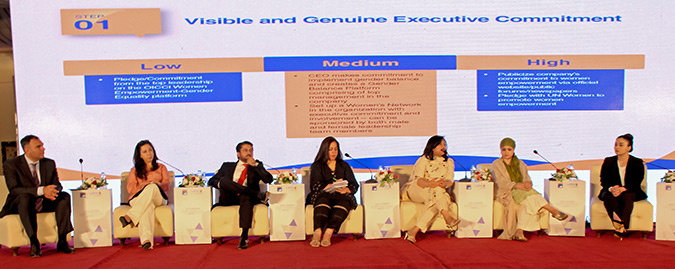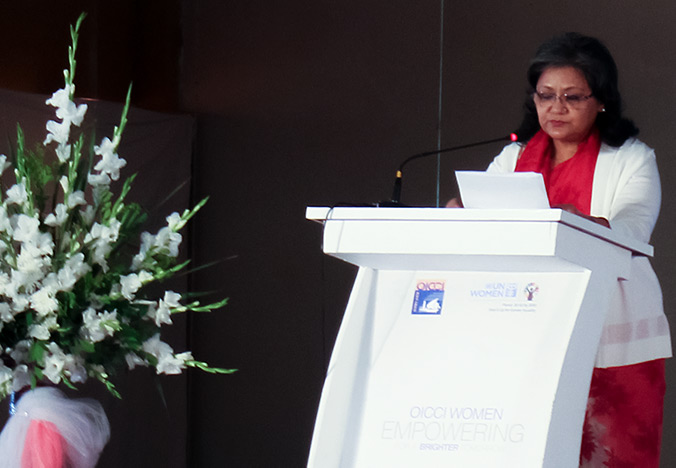UN Women and Pakistan's Overseas Investors Chamber of Commerce and Industry Jointly Promote Gender Diversity in Companies
Date:

Press Release
Karachi, Pakistan — UN Women and the Overseas Investors Chamber of Commerce and Industry (OICCI) today brought together CEOs of numerous leading private sector companies to talk about cooperating to empower women in Pakistan's corporate sector.

The dialogue on "Empowering Women for a Brighter Tomorrow" ended with 58 of the companies voicing their agreement to support the OICCI Women Initiative to promote gender equality in line with the United Nations Women's Empowerment Principles.
The Women's Empowerment Principles are a set of practical guidelines for the private sector to increase women's access to work opportunities and skills, and promote a harassment-free workplace. Globally 1,661 companies have adopted the principles. Among them, 25 companies have signed in Pakistan, including Nestle, Unilever, PepsiCo and 17 leading small- and medium-sized enterprises based in Sialkot.
OICCI has developed a Roadmap for Gender Balance to guide its members on gender diversity initiatives. This year, the CSR (Corporate Social Responsibility) Subcommittee launched a common project for member companies on "Gender Equality and Women Empowerment."

Said Bruno Olierhoek, Chairman of the OICCI CSR Subcommittee and CEO of Nestlé: "The OICCI Women Initiative wants to propose a concrete way forward, a 'how to' manual, helping organizations to have a women-friendly work environment. I believe that OICCI together with UN Women can start a movement in Pakistan by promoting this simple and pragmatic approach and thus making a real impact."

"Partnerships between UN Women and the private sector bring together essential skills and resources that are complementary and mutually reinforcing," said Sangeeta Thapa, Deputy Representative of UN Women Pakistan. "At UN Women, we recognize the important role of the private sector in advancing development, and we do our best to support private sector companies in their genuine endeavors and initiatives to empower women."
Shazia Syed, the CEO of Unilever, said the most important task is "to dismantle the stereotypes that persist in our society about women's professional life."
Faiza Imtiaz, Partner at Engage Consulting, presented the results of its recent survey of 24 leading companies in Pakistan, which she said showed that "mindsets need to change". About 45 per cent of the women surveyed said they fear being stereotyped and 48 per cent confessed that they generally "act like men" in order to advance their careers. "Companies must ensure that women gain confidence in their own abilities and competences," Ms. Imtiaz said.
Other speakers at the event included representatives from Standard Chartered Bank, P&G, Shell and KM Ashraf and Sons, a local company and WEP signatory. Participants said key steps to empower women in private companies include the visible and genuine commitment of management, security and support for relocating female workers, and allowances for women to combine work with home responsibilities.
The event was attended by CEOs from diverse sectors such as banking, pharmaceuticals, accounting, automobiles, chemicals, financial services, telecommunications, food and beverages, and industrial engineering.
Evidence shows that gender diversity in senior positions can improve the financial performance of firms because it broadens the range of perspectives in decision-making and stimulates critical thinking and creativity among teams.
The OICCI dialogue is part of UN Women's overall mission to enhance women's participation and leadership in the private sector. UN Women's Women Economic Empowerment Programme is currently being scaled up to all four provinces of Pakistan and the Federally Administered Tribal Areas to help women and other excluded groups access income-generating activities, formal employment and entrepreneurship opportunities. The programme will provide some 6,700 women with trainings, support in business development and financial literacy skills.
For more information:
Please contact
Faria Salman
Head of Communications,
Strategic Management and Partnerships for UN Women Pakistan
Email: faria.salman@unwomen.org